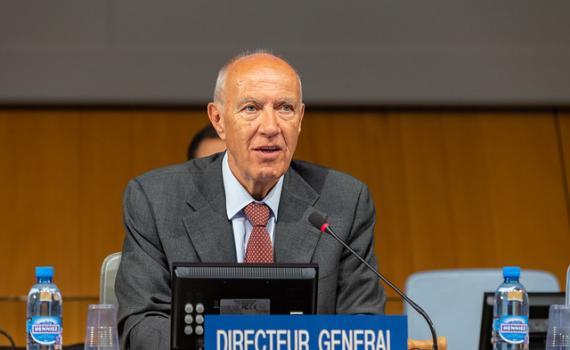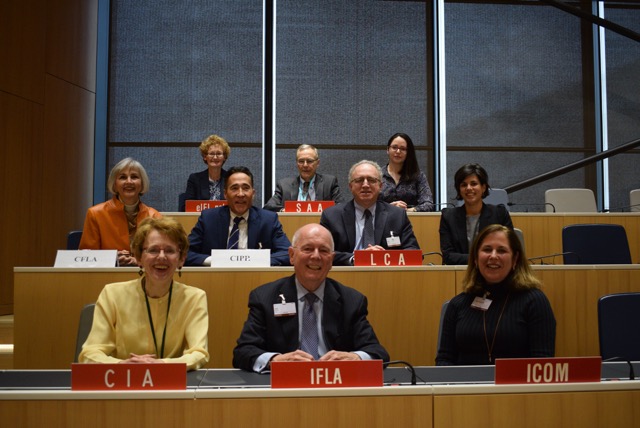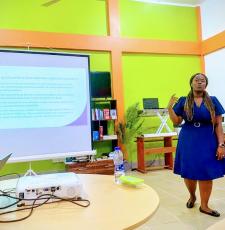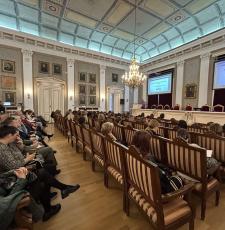
Teresa Hackett, EIFL Copyright and Libraries Programme Manager, participated in the 38th session of the World Intellectual Property Organization (WIPO) Standing Committee on Copyright and Related Rights (SCCR) that took place in Geneva from 1-5 April 2019. EIFL engaged with member states to explain why libraries need an international copyright framework, and how the planned WIPO regional seminars can contribute to achieving real results.
Encouragement for libraries and archives
At the opening session of WIPO’s Standing Committee on Copyright and Related Rights (SCCR), the Director General, Mr Francis Gurry, encouraged member states to consider discussions on libraries and archives not as technical issues, but to think broadly about the societal role of libraries and archives and the changing environment for knowledge distribution.
In his remarks, Mr Gurry stressed the importance of libraries and archives to humanity over several millennia, and especially now in an age where the integrity of information is often questioned. And while a treaty on libraries and archives will not solve all of the multiple issues facing libraries and archives, it will address certain parts of what is needed to determine how these institutions will function in the digital, globalized world.
Discussions on these broad issues are very important because they will determine the framework for the protection of authors and authors’ rights in the fast-changing context of the 21st century, said Mr Gurry. Read the Director General’s full remarks here.
EIFL welcomed the recognition by the Director General of the role of libraries, and we look forward to working with member states on achieving solutions that will bring real benefit to libraries wherever they are located.
Action plan on the move
New analysis and studies
During the week, the WIPO action plan on libraries, archives and education (SCCR/36/7) was clearly ‘in action’ with presentations of updated studies and analysis, and the announcement of details of three regional seminars planned over the coming months.
A key component of the action plans is the typology for each sector, that is, an analysis that groups exceptions and limitations according to activities, for example, preservation by a library, distance learning by an educational institution, use of a work for an exhibition catalogue by a museum. By classifying the exceptions, the typologies illustrate common activities across the sectors. By providing a detailed examination of the elements of the provisions in national law, the typologies provide guidance for WIPO member states on the terms of any legal instrument on copyright exceptions, and also to lawmakers when revising their national copyright law.
For libraries,the typology was presented by Professor Crews, for education by Professor Daniel Seng, and for museums, by Professor Yaniv Benhamou.
In addition, Dr David Sutton presented a background paper on archives and copyright setting out the copyright challenges facing archives, with a special emphasis on the digital environment. The paper is recommended reading for anyone who wants to learn about the nature and characteristics of material in archives, the prevalence of orphan works in archives, and how archives need to work across borders.
Other studies presented during the week were a draft report on practices and challenges relating to online distance education and research activities, by Professor Raquel Xalabarder, and an updated scoping study on access to copyright protected works by persons with disabilities, by Professors Caroline Ncube and Blake Reid.
Details of three regional seminars revealed
In an information briefing from the WIPO Secretariat, the location and dates of the three regional seminars were announced. The first seminar, requested by the Group of Asia-Pacific countries, takes place in Singapore on 29-30 April 2019. The second seminar for 55 member states of the African Group will take place in Nairobi on 12-13 June 2019, and the seminar for Latin America and the Caribbean will be held in the Dominican Republic on 4-5 July 2019.
The objective of the two-day seminars is to analyze the situation of libraries, archives and museums, as well as educational and research institutions, in each region, and to identify areas for action with respect to the limitations and exceptions.
The format includes plenary sessions and parallel working groups. The authors of the WIPO studies on libraries, archives, museums and education are expected to participate (Professors Crews, Benhamou, Seng and Xalabarder are confirmed for Singapore).
Participants will be divided into four parallel working groups to discuss challenges and opportunities with regard to limitations and exceptions. Each group will have a facilitator, chair and rapporteur to report the findings, observations and proposals of the group to the plenary.
Organizations with observer status at WIPO, such as EIFL, may participate in the seminars. It is essential that beneficiaries, such as libraries and archives, are well represented. Delegates must benefit from the expertise of local practitioners who know the real challenges and on-the-ground conditions. EIFL is working hard with our partners to ensure that there is expert regional representation for fruitful and productive discussions focused on results and achieving meaningful progress at WIPO.
Debunking copyright myths and accessing our documentary heritage
There were two lunch-time events concerning libraries and archives. In the first of the events, EIFL took part in a panel discussion that sought to debunk myths sometimes heard in copyright debates. /sites/default/files/resources/sccr-38-flyer2.pdf b‘Truths, Trends and Tropes: Unpacking the Debate around Copyright Exceptions and Limitations’ aimed to provide context and understanding to support delegates engaging in the issues at SCCR, and in the planned WIPO regional seminars.
Mr George Tebagana, Permanent Mission of Uganda and Coordinator of the African Group, introduced the topic, while EIFL kicked off the discussion by outlining why we have exceptions and limitations. Other speakers addressed common misconceptions, such as ‘exceptions mean the end of markets’, ‘licences can solve it all’, and ‘there’s no need for global normative work on limitations and exceptions’.
The second event was a panel discussion about the intersection of copyright and archival material. Speakers at /sites/default/files/resources/flyer_for_archives_side_event_2_april.final.pdf Archives and Copyright: Access to our Documentary Heritage’ highlighted how, due to the unique nature of archival material, archives absolutely depend on exceptions for their work. For example, most of the material in the archive of the International Federation of Red Cross and Red Crescent Societies (IFRC), such as communications from field workers, records on disaster relief operations, broadcast film and news reports, are orphan works.
Cauê Oliveira Fanha, Mission of Brazil to the WTO, spoke movingly about how Brazil’s National Museum fire in 2018 was a wake-up call for everyone, not only in Brazil but around the world. Among the irreplaceable material destroyed in the fire were many in-copyright works such as text and sound recordings of lost indigenous languages, and correspondence from the Brazilian diplomat, Bertha Lutz. Lutz, who signed the 1945 United Nations Charter on behalf of the Brazilian government, was instrumental in including the need for equal rights for men and women in the Charter. But she died without heirs and due to the consequent legal uncertainty over ownership, the National Museum had put off digitizing the correspondence while they tried to find the copyright owners to clear the rights. The sad case of the museum fire illustrates why a clear legal framework is needed to enable cultural heritage institutions to undertake preservation and access activities without hindrance.
Next steps
EIFL is working with partners to prepare for the WIPO regional seminars, and is looking forward to attending the seminar for Africa in Nairobi on 12-13 June 2019. The findings and proposals from the regional seminars, that culminate in an international conference in Geneva on 17-18 October 2019 (just before SCCR/39), are an important step in achieving progress towards an international copyright framework that supports libraries and archives.
The next session of SCCR (SCCR/39) takes place in Geneva on 21-25 October 2019.
Find out more
- Standing Committee on Copyright and Related Rights Thirty-Eight Session: wipo.int/meetings/en/details.jsp?meeting_id=50418 Meeting documents.
- Statements by EIFL at SCCR/38 (protection of broadcasting organizations, libraries and archives).
- Video on demand SCCR/38. From the dropdown list, select Standing Committee on Copyright and Related Rights: Thirty-Eighth session.
- Twitter hashtag #sccr38, #Copyright4Libraries.
- Background, EIFL Copyright and Libraries Programme - Why EIFL is advocating for an international treaty for libraries and archives.
SHARE / PRINT









